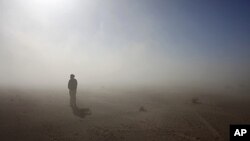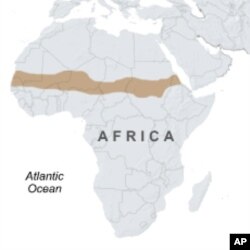United Nations and international aid agencies warn drought and food shortages in the Sahel region of West Africa are causing millions of people to go hungry and threatening lives. The agencies are urging the international community to respond quickly to the region's acute needs.
Aid agencies warn that international donors are starving Africa’s Sahel region of money needed to avert a humanitarian catastrophe. Momodou Larmin Fye, the Sahel regional representative in Dakar for the International Federation of Red Cross and Red Crescent Societies, says the estimated 10 to 14 million people currently affected by drought in the Sahel could rise to 23 million if this region continues to be neglected.
“Like the Horn of Africa, the Red Cross and Red Crescent movement is extremely concerned that the situation unfolding in the Sahel could quickly develop into a humanitarian disaster if the world does not start paying attention to the plight of these people,” he said.
The United Nations notes aid agencies have received only $135 million of the $720 million needed to fund humanitarian operations in six countries of the Sahel. The region has been hit by recurring droughts and food crises since 1973. The latest was in 2009 and 2010.
Niger, Chad, Mali, Burkina Faso, Mauritania and Senegal once again are experiencing food insecurity due to poor harvests, caused by failed rains, pest attacks and localized flooding. Aid agencies say people are facing a crisis on a scale they have not experienced before. They say people are particularly vulnerable now because they lack the coping mechanisms to deal with this new emergency.
In addition, the director of the United Nations Information Service in Geneva, Corinne Momal-Vanian, says insecurity is making it difficult for humanitarian agencies to access the region. She says last year's unrest in Libya, and to a lesser extent the crisis in Ivory Coast, are having significant consequences.
“The return of hundreds of thousands of people has added to the vulnerability of the communities where they come from," she said. "And, of course, remittances have been lost, trade has been halted, and in addition, there has been an influx of weapons that has fueled insecurity. So, these factors are added factors this year. But, many of the vulnerabilities existed before the Libyan crisis.”
The Sahel is plagued with chronic levels of food insecurity, poverty and malnutrition. The International Red Cross Federation reports more than 50 percent of the rural population lives on the edge of the crisis. It notes food prices in the region have increased between 35 and 85 percent over the past five years.
The Red Cross says it is scaling up its operations. It says its priorities include food distribution, access to clean water and sanitation, and providing basic health care. The agency says it is very concerned about preventing and containing outbreaks of diseases, such as cholera, meningitis and measles.





